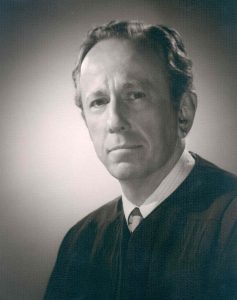
Photo info ...
(Jan. 6, 1918 – Dec. 6, 2008). The grandson of the founder of , Paul H. Buchanan turned down an opportunity to go into the family business and instead forged a career in the law that spanned nearly five decades and revolutionized legal writing.
Buchanan received his early education at IPS School 60 (now the Butler University Lab School) and graduated from in 1935. After earning a B.S. from Swarthmore College in political science in 1939, Buchanan was working on a master’s degree at the University of Pennsylvania when he was offered a commission in the U.S. Navy. Then broke and in debt, Buchanan purchased his uniforms on credit from . He served for three years in the Pacific Theater both before and during World War II and finished his military service with a rank of Lieutenant (junior grade).
Following the war, Buchanan moved to Colorado for health reasons and attended the University of Denver Law School. He returned to Indianapolis upon graduation and in 1955, joined Swarthmore classmate Lewis Bose to found the law firm of Bose, McKinney & Evans.
Buchanan helped organize the Indianapolis Bar Foundation (IBF) in 1968 when he was president of the and served on the IBF board of directors for the next 30 years. A strong believer in removing partisan politics from the bench, Buchanan campaigned for and helped write a 1971 law that created a merit-based system for nominating judges to . He was subsequently appointed the first chairman of the Marion County Judicial Nominating Commission.
In 1970, Buchanan ran as a Republican for an open slot on the Indiana Court of Appeals, surviving a Democrat sweep of the Statehouse to become the only Republican elected on the statewide ticket. Four years and one constitutional amendment later, Buchanan ran for reelection to the court, but this time under a new system of nonpartisan judicial elections that he had pushed for during his 1970 campaign. Buchanan was subsequently elected chief judge, a post he held for nine years.
During his 22 years on the bench, Buchanan pioneered a clear and concise style of legal writing that has been widely emulated by courts throughout the U.S. Buchanan was a staunch advocate of brevity, clarity, and forcefulness in legal writing, seeking to banish the “dead hand of the past” that seemed to demand judicial opinions be written in archaic, rambling language which forced attorneys to wade through pages of disorganized text to figure out the bottom line. Buchanan’s simplified system organized opinions in sections—case summary, facts, issues, and decision—and was quickly embraced by courts nationwide.
An accomplished writer himself, Buchanan also penned , a popular column on lawyers and courts that was featured for more than 25 years in the Indiana Bar Association’s monthly magazine, Res Gestae.
Buchanan retired on January 1, 1993, just a few days before his 75th birthday. He was the first appellate court judge to leave the bench under a mandatory retirement law that he had campaigned for 23 years earlier.
CITE THIS ENTRY
APA:
Cierzniak, E. (2021). Paul H. Buchanan Jr. Encyclopedia of Indianapolis. Retrieved Feb 21, 2026, from https://indyencyclopedia.org/paul-h-buchanan-jr/.
MLA:
Cierzniak, Elizabeth. “Paul H. Buchanan Jr.” Encyclopedia of Indianapolis, 2021, https://indyencyclopedia.org/paul-h-buchanan-jr/. Accessed 21 Feb 2026.
Chicago:
Cierzniak, Elizabeth. “Paul H. Buchanan Jr.” Encyclopedia of Indianapolis, 2021. Accessed Feb 21, 2026. https://indyencyclopedia.org/paul-h-buchanan-jr/.

Help improve this entry
Contribute information, offer corrections, suggest images.
You can also recommend new entries related to this topic.